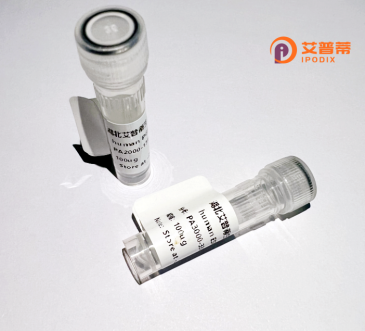
| 纯度 | >90%SDS-PAGE. |
| 种属 | Human |
| 靶点 | MED16 |
| Uniprot No | Q9Y2X0 |
| 内毒素 | < 0.01EU/μg |
| 表达宿主 | E.coli |
| 表达区间 | 1-860aa |
| 活性数据 | MCDLRRPAAGGMMDLAYVCEWEKWSKSTHCPSVPLACAWSCRNLIAFTMDLRSDDQDLTRMIHILDTEHPWDLHSIPSEHHEAITCLEWDQSGSRLLSADADGQIKCWSMADHLANSWESSVGSLVEGDPIVALSWLHNGVKLALHVEKSGASSFGEKFSRVKFSPSLTLFGGKPMEGWIAVTVSGLVTVSLLKPSGQVLTSTESLCRLRGRVALADIAFTGGGNIVVATADGSSASPVQFYKVCVSVVSEKCRIDTEILPSLFMRCTTDLNRKDKFPAITHLKFLARDMSEQVLLCASSQTSSIVECWSLRKEGLPVNNIFQQISPVVGDKQPTILKWRILSATNDLDRVSAVALPKLPISLTNTDLKVASDTQFYPGLGLALAFHDGSVHIVHRLSLQTMAVFYSSAAPRPVDEPAMKRPRTAGPAVHLKAMQLSWTSLALVGIDSHGKLSVLRLSPSMGHPLEVGLALRHLLFLLEYCMVTGYDWWDILLHVQPSMVQSLVEKLHEEYTRQTAALQQVLSTRILAMKASLCKLSPCTVTRVCDYHTKLFLIAISSTLKSLLRPHFLNTPDKSPGDRLTEICTKITDVDIDKVMINLKTEEFVLDMNTLQALQQLLQWVGDFVLYLLASLPNQGSLLRPGHSFLRDGTSLGMLRELMVVIRIWGLLKPSCLPVYTATSDTQDSMSLLFRLLTKLWICFPSTGPCSVWVLLGWQPLPGRDEGPASEPDEALVDECCLLPSQLLIPSLDWLPASDGLVSRLQPKQPLRLQFGRAPTLPGSAATLQLDGLARAPGQPKIDHLRRLHLGACPTEECKACTRCGCVTMLKSPNRTTAVKQWEQRWIKNCLCGGLWWRVPLSYP |
| 分子量 | 121.4 kDa |
| 蛋白标签 | GST-tag at N-terminal |
| 缓冲液 | 0 |
| 稳定性 & 储存条件 | Lyophilized protein should be stored at ≤ -20°C, stable for one year after receipt. Reconstituted protein solution can be stored at 2-8°C for 2-7 days. Aliquots of reconstituted samples are stable at ≤ -20°C for 3 months. |
| 复溶 | Always centrifuge tubes before opening.Do not mix by vortex or pipetting. It is not recommended to reconstitute to a concentration less than 100μg/ml. Dissolve the lyophilized protein in distilled water. Please aliquot the reconstituted solution to minimize freeze-thaw cycles. |
以下是关于重组人MED16蛋白的假设参考文献示例(实际文献可能需要通过数据库验证):
---
1. **文献名称**: *MED16 mediates antioxidant gene expression via interaction with Nrf2*
**作者**: Tanaka K, et al.
**摘要**: 研究报道重组人MED16蛋白与转录因子Nrf2结合,调控抗氧化反应基因的转录。通过体外Pull-down实验证实直接互作,并揭示MED16在中介体复合物中的共激活作用。
2. **文献名称**: *Recombinant production and structural characterization of human MED16*
**作者**: Zhang R, et al.
**摘要**: 本研究利用大肠杆菌系统表达并纯化重组人MED16蛋白,采用质谱和圆二色谱分析其结构,确认其保守的α螺旋结构域对结合RNA聚合酶II的关键性。
3. **文献名称**: *Functional analysis of MED16 in mitochondrial stress signaling*
**作者**: Lee S, et al.
**摘要**: 发现MED16参与线粒体未折叠蛋白反应(UPRmt)。重组MED16蛋白实验表明其与ATF5转录因子的相互作用,调控应激相关基因的表达。
4. **文献名称**: *MED16 modulates TGF-β signaling through SMAD protein recruitment*
**作者**: Gupta M, et al.
**摘要**: 研究利用重组MED16蛋白进行蛋白质相互作用筛选,发现其通过结合SMAD3增强TGF-β信号通路的转录激活,影响细胞增殖和分化。
---
**注意**:以上为示例性内容,实际文献需通过PubMed、Google Scholar等平台检索关键词“recombinant human MED16”、“MED16 mediator complex”等获取。若研究主题较新,建议扩展检索范围至相关通路(如转录调控)或结合互作蛋白(如Nrf2、SMAD3)进行关联搜索。
Human MED16. a subunit of the Mediator complex, plays a critical role in regulating RNA polymerase II-dependent transcription. The Mediator complex serves as a molecular bridge between transcription factors and the basal transcriptional machinery, fine-tuning gene expression in response to developmental or environmental cues. MED16 (also known as Thyroid Receptor-Associated Protein 220. Trap220) is essential for stabilizing the Mediator’s multi-subunit architecture and facilitating interactions with specific nuclear receptors and transcription activators.
Studies link MED16 to diverse biological processes, including stress responses, lipid metabolism, and cell cycle regulation. It participates in signaling pathways such as the p53-mediated DNA damage response and the PPARγ-driven adipogenic program. Dysregulation of MED16 has been implicated in metabolic disorders, cancer progression, and neurodegenerative diseases, underscoring its therapeutic relevance.
Recombinant human MED16 protein is typically produced in prokaryotic (e.g., E. coli) or eukaryotic expression systems to enable functional studies. Purified through affinity tags (e.g., His-tag), it retains structural integrity for in vitro assays probing protein-protein/DNA interactions, enzymatic activity profiling, or compound screening. This tool has advanced research into Mediator complex dynamics, transcriptional mechanisms, and drug discovery targeting transcription-related pathologies. Recent structural work using recombinant MED16 has also clarified its role in Mediator-nuclear receptor interfaces, informing precision medicine strategies.
×